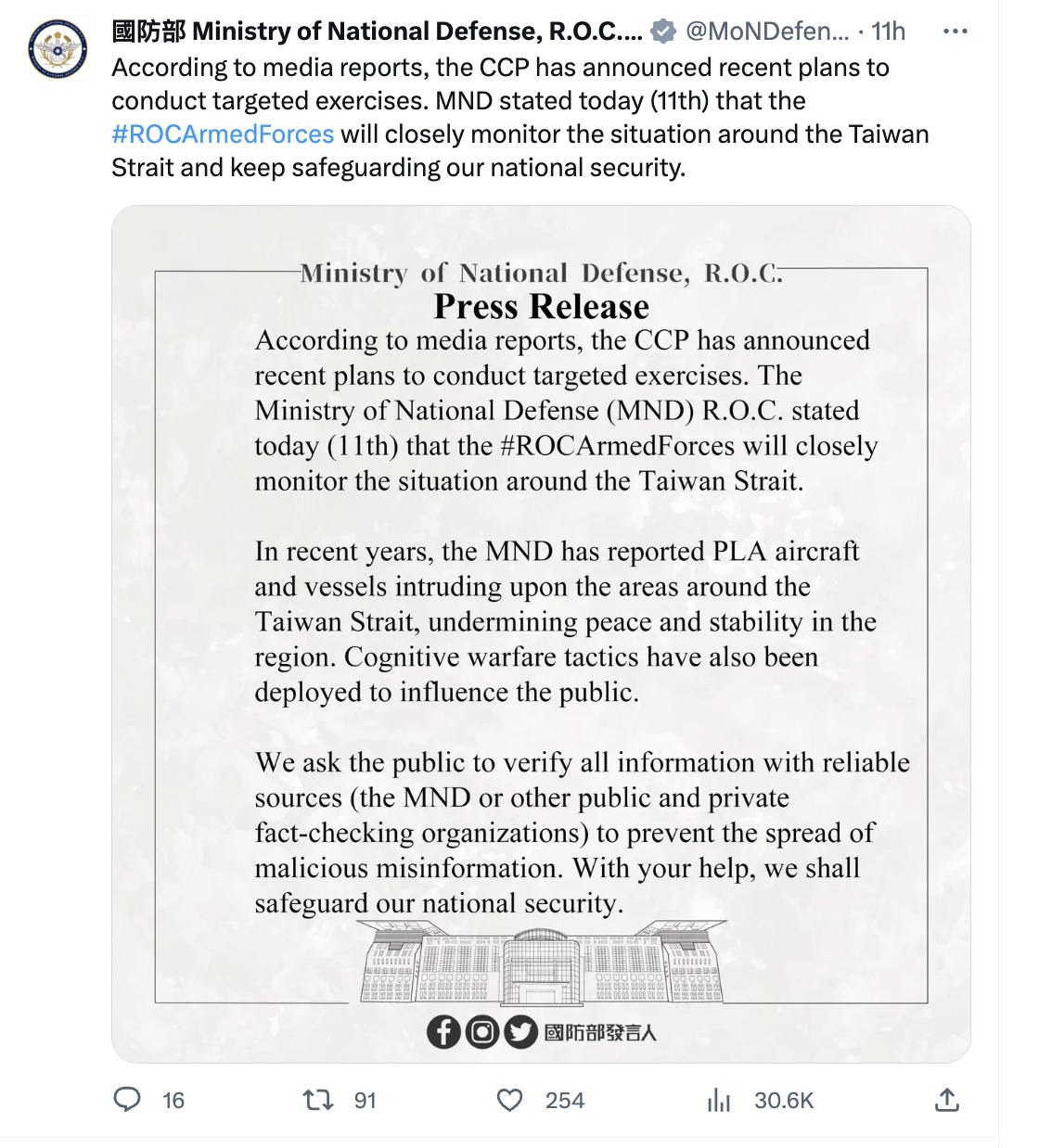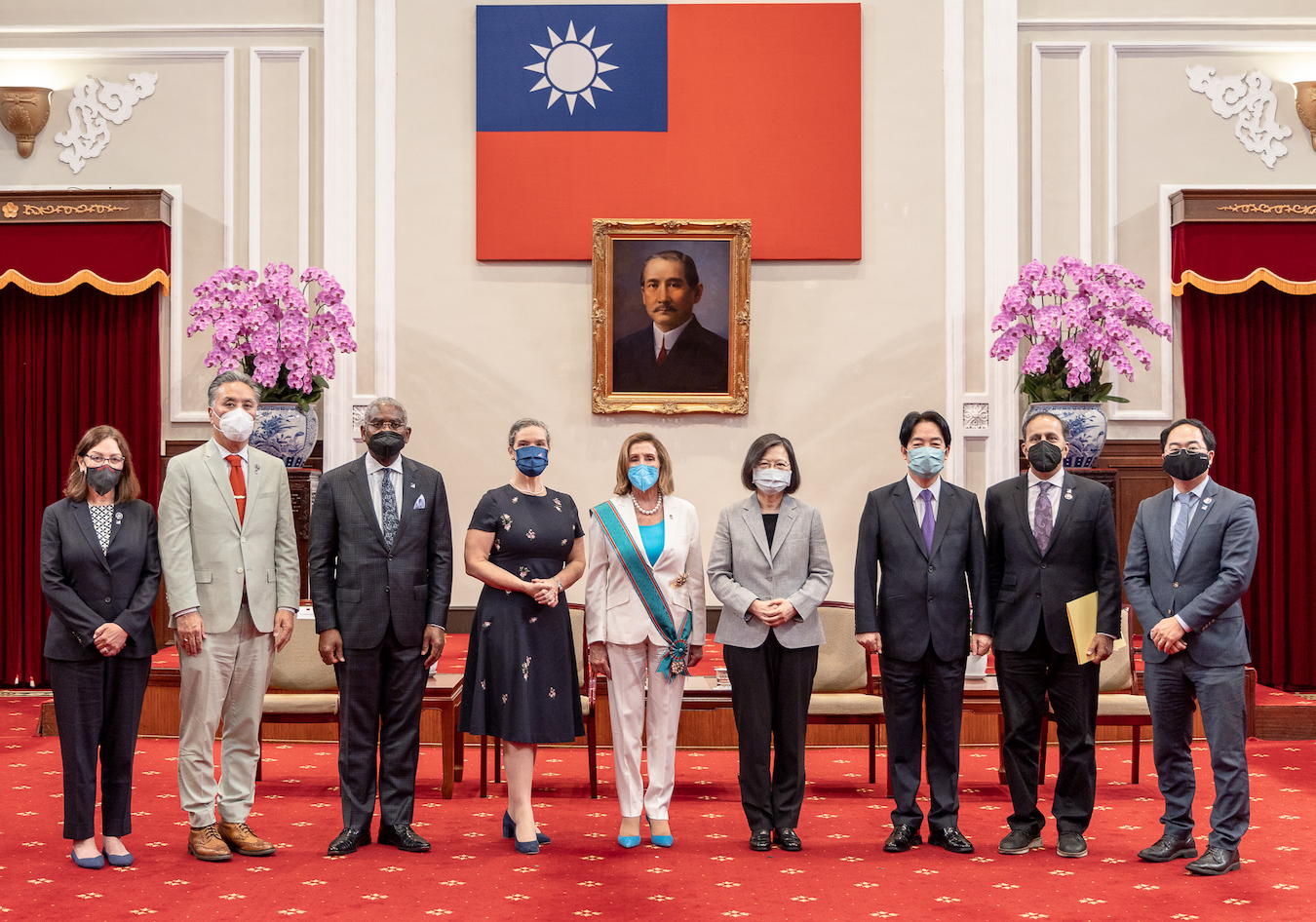by Brian Hioe
語言:
English
Photo Credit: Took-ranch/WikiCommons/Public Domain
THE CHINESE GOVERNMENT has announced that it will conduct military exercises in the East China Sea starting today until the 14th, in an area approximately 500 kilometers away from Taiwan. Yesterday morning, the Zhejiang Maritime Safety Administration announced a no-sail order lasting from 12 PM today until 4 PM on August 14th in the area the exercises are slated to take place.
The military exercises were announced with little warning, though it was anticipated by experts that China could potentially conduct military exercises this month. It is possible that China will abruptly extend the exercises, as has occurred on past occasions when China suddenly announced military exercises.
Perhaps symbolically, the military exercises occur approximately one year after the historic visit by then-US Speaker of the House Nancy Pelosi to Taiwan, as the first US Speaker of the House to visit Taiwan in a quarter of a century. After the visit, China conducted a series of live-fire exercises that took place closer to Taiwan compared to drilling during the Third Taiwan Straits Crisis.
 Ministry of National Defense tweet on the announcement
Ministry of National Defense tweet on the announcement
China has framed its exercises as a response to DPP presidential candidate William Lai’s plans to transit through the US on the way to attend the Paraguayan presidential inauguration. Lai is to stop in New York today, while he is to stop in San Francisco on August 16th. Though Lai visited the US in 2020 and 2022, his current visit has greater sensitivity because he is now the DPP’s presidential candidate for the 2024 elections.
It is traditional for Taiwanese presidential candidates to visit the US before elections, not only to meet with US government officials, but to solicit funds from wealthy members of the Taiwanese diaspora. This occurs with candidates of all political camps. Ko Wen-je, the presidential candidate of the TPP, already traveled to the US in April, with KMT presidential candidate Hou You-yi anticipated to visit the US sometime in the fall. While Terry Gou has hinted at but not announced a presidential run, he traveled to the US twice this year.
Nevertheless, the Chinese government will frame the exercises as a response to the provocation of Lai’s visit. China’s ambassador to the US, Xie Feng, previously termed Lai a “gray rhinoceros that is charging” and stated that China hoped to prevent the visit.
In reality, the Chinese government was likely to conduct a set of military exercises before next year’s elections, so as to pressure Taiwan, and bolster the narrative that electing a DPP president would endanger cross-strait relations. Lai’s visit offers a pretext for that. For its part, to avoid coming off as deliberately and needlessly provoking China, the DPP has sought to be low-key with the visit. The US is not likely to be too flashy about the Lai stopovers for this same reason. The DPP has stated that it is preparing for a possible wave of disinformation and misinformation about the trip.
Since last year’s live-fire exercises in the wake of the Pelosi visit, Chinese military exercises have increased in frequency around Taiwan, Though incursions into Taiwan’s Air Defense Identification Zone already took place on a daily basis, naval activity has decidedly been on the increase since then.
 The Pelosi delegation meeting with President Tsai Ing-wen. Photo credit: Office of the President/Wang Yu Chin/CC BY 2.0
The Pelosi delegation meeting with President Tsai Ing-wen. Photo credit: Office of the President/Wang Yu Chin/CC BY 2.0
It is to be seen whether international media responds as it did to the post-Pelosi live-fire exercises, that is, by reporting as though an invasion could break out anytime. If there were plans for an invasion, this would have been detectable months in advance, through troops massing on Chinese coasts. A serious invasion would also be detectable through preparations such as preparing large numbers of body bags for Chinese troop casualties, as was observed of Russia in the build-up to the invasion of Ukraine. Moreover, the weather conditions are only right for a potential invasion to take place in specific windows of each year.
To this extent, though there have been some warnings that China could perhaps attempt an intermediate form of military activity such as attacking an outlying island of Taiwan. Nevertheless, any significant attempt to take an outlying island that is populated would also be detectable in advance through troop movements, with experts having suggested several weeks warning.
If anything, the drills would be practice exercises by the PLA in carrying out a blockade. And though drills can serve as a way to camouflage plans to carry out military operations, China is unlikely to carry out an actual blockade of Taiwan without waiting and observing as to what the results of the next presidential race are. It is worth remembering that a blockade would be an act of war that Taiwan would respond to with force.
Either way, one anticipates a great deal of media focus on Taiwan in the coming days. It is not impossible that this is more occluding than not, however.

